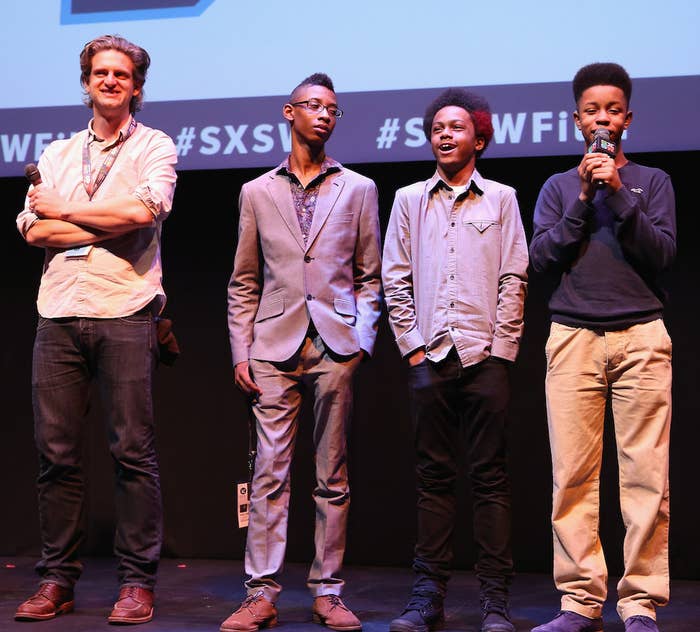
AUSTIN — Last year, the Brooklyn-based heavy metal band Unlocking the Truth — a trio that comprises Malcolm Brickhouse, Jarad Dawkins, and Alec Atkins, all of whom are still in middle school — made major headlines when they were signed to a $1.8 million contract with Sony Music Entertainment.
That contract, however, appears to be short-lived. In an interview with BuzzFeed News at the SXSW Festival, Brickhouse, Dawkins, and Atkins said they are leaving Sony Music.
"Our attorneys are in the process of us exiting the label," Dawkins said, with the band's manager Alan Sacks and his partner Kevin Jonas Sr. (the team behind the Jonas Brothers) sitting nearby.
The reason? "Just complications," Dawkins said.
"We can't discuss the complications," added Atkins. "But complications — that's what I can tell you."
When asked about the about the fate of the $1.8 million tied up in their contract, both Dawkins and Atkins answered with a swift "no comment."
Reps for Sony Music did not immediately return a request for comment.
The interview was just hours before the feature documentary about the band's meteoric rise to fame, Breaking a Monster, premiered as part of the SXSW Film Festival. (UTT is also scheduled to perform on Tuesday for the SXSW Music Festival.) The film traces the band's rise from gathering a following on YouTube with videos of the group performing in Times Square to Sacks signing the group and helping to orchestrate the deal with Sony Music.

It also depicts friction between the band and Sacks, as well as with its label. In meetings with Sony Music executives, Brickhouse, Dawkins, and Atkins object to marketing material that presents the trio as cartoon characters akin to the scowling black kids from Aaron McGruder's popular comic strip The Boondocks. In a separate meeting, the band members appear restless and unengaged with an executive going over plans for the band's tour. When Sacks confronts them later about the meeting, Brickhouse accuses him of just being interested in them for the money, and not caring about their music, a characterization Sacks takes immediate offense to.
The unvarnished approach was paramount to director Luke Meyer, who first met the band when he created a three-and-a-half-minute video portrait of Brickhouse (lead vocals and guitar) and Dawkins (drums), and their performances in Times Square (before they asked Atkins to join them as their bass player). After Sacks signed UTT, they approached Meyer to make a feature documentary about the band, which Meyer only agreed to after securing independent financing that would allow him creative control.
"We were able to see that there was a proper film here, not just a publicity documentary, you know, like a marketing tool," Meyer told BuzzFeed News in a phone interview before the festival. "They're not being pre-packaged into a traditional pop-star situation. Their personalities are given space to take up whatever space that they need to."
It did not appear to be difficult for Meyer to get the band to be themselves. "I didn't care about no cameras," said Brickhouse. "It was real life. I wasn't trying to act!"
"That's what a documentary is mainly about, have your life being shot," added Dawkins. "There's nothing to be acted."
Meyer spent several months following the band — in meetings with Sony, while touring festivals like SXSW and Coachella, and at home in Brooklyn. Brickhouse, Dawkins, and Atkins all sang his praises as a filmmaker, but they still chafed at the intrusion into their lives.
"We had those wireless packs that run from our back all the way to our chest, and those things got pretty annoying at first," said Atkins. "But we learned how to deal with it. After that, it was pretty much smooth sailing."
Brickhouse felt differently. "It got annoying," he said. "I don't care. It got annoying. I'm not going to say it was smooth sailing. It was annoying the whole time to me."
Throughout the film, there is an almost constant tension between the desire Brickhouse, Dawkins, and Atkins had to be successful, and their desire to just be young boys in eighth grade. There are several moments in the film where Brickhouse especially defies Sacks' wishes for him to stop skateboarding, in fear of an injury that could destroy his nimble guitar skills.
"Fortunately, they didn't do anything that I ever felt they were truly putting themselves in harm's way or doing anything illegal or anything like that while I was around," said Meyer. "They're not supposed to be skateboarding by agreements they have amongst themselves, but it's not like a 13-year-old shouldn't be skateboarding at all. So for me to witness that is fine."
Brickhouse appears to have won that particular fight — Sacks said that this summer, he's sending his lead singer to skate camp — but the band will certainly stay busy. They will continue to tour this year, including performances at music festivals like Bonnaroo, Rise Up, and Rock on the Range. They also plan to release a self-titled book in May, and they hope to put out out a six-song EP at some point in 2015.
With so much at stake, it's clear that the pressure for professional success is winning the larger battle over the boys' childhoods.
"Well, we do actually realize in our heads that what we do [as a band] is more important than our childhood," said Atkins. "Because we can save all that playing stuff for later. But right now it's about getting exposure."
Added Dawkins, "It is difficult to think that half of your life now goes to your music and what you do. But, like, at the end of the day it's worth it, and you know you're going to make something out of it."
Brickhouse shrugged. "This is what I signed up for," he said. "So, we have to get used to it. Even if you don't like it. So, that's how I think of it. … If I want to make my dreams come true, then this is what I gotta do."
